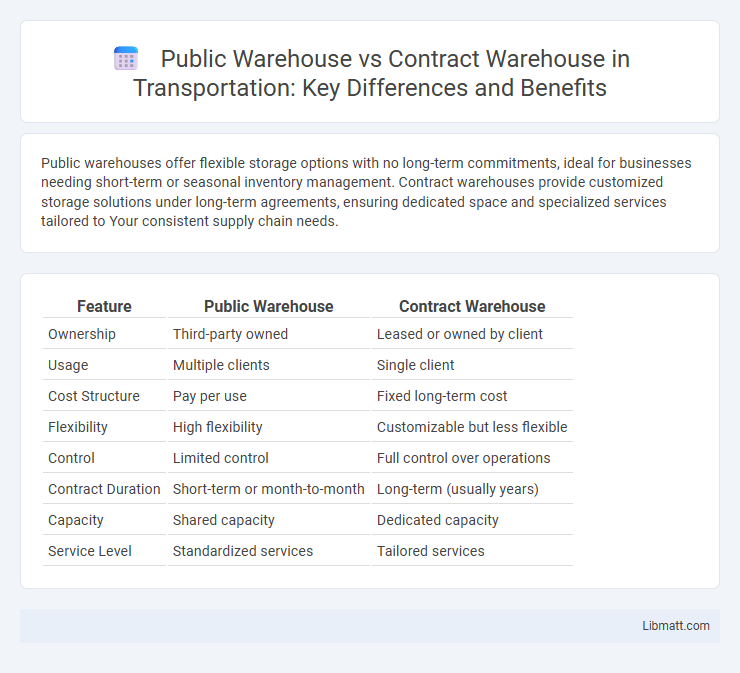Public warehouses offer flexible storage options with no long-term commitments, ideal for businesses needing short-term or seasonal inventory management. Contract warehouses provide customized storage solutions under long-term agreements, ensuring dedicated space and specialized services tailored to Your consistent supply chain needs.
Table of Comparison
| Feature | Public Warehouse | Contract Warehouse |
|---|---|---|
| Ownership | Third-party owned | Leased or owned by client |
| Usage | Multiple clients | Single client |
| Cost Structure | Pay per use | Fixed long-term cost |
| Flexibility | High flexibility | Customizable but less flexible |
| Control | Limited control | Full control over operations |
| Contract Duration | Short-term or month-to-month | Long-term (usually years) |
| Capacity | Shared capacity | Dedicated capacity |
| Service Level | Standardized services | Tailored services |
Overview: Understanding Public vs Contract Warehousing
Public warehouses offer shared storage facilities available to multiple businesses, providing flexibility and cost-effective solutions for short-term or seasonal inventory needs. Contract warehouses involve exclusive agreements between a business and a warehouse provider, ensuring tailored services, dedicated space, and long-term storage solutions. Choosing between public and contract warehousing depends on factors such as inventory volume, storage duration, customization requirements, and budget constraints.
Key Differences Between Public and Contract Warehouses
Public warehouses offer flexible storage options for multiple clients with shared spaces, while contract warehouses provide dedicated facilities tailored to a single client's specific needs. You benefit from lower upfront costs and scalability in public warehouses, whereas contract warehouses deliver greater control, customized services, and long-term cost efficiency. Key differences include ownership, cost structure, service customization, and commitment duration.
Cost Comparison: Public Warehouse vs Contract Warehouse
Public warehouses offer flexible, pay-as-you-go storage options ideal for businesses with fluctuating inventory levels, resulting in lower upfront costs and no long-term commitment. Contract warehouses require long-term agreements with fixed fees, providing customized services and potentially lower unit costs for consistent, high-volume storage needs. Cost efficiency depends on inventory turnover rates and storage duration, with public warehouses benefiting short-term or seasonal use, while contract warehouses suit steady, large-scale operations.
Flexibility and Scalability in Warehouse Solutions
Public warehouses offer high flexibility and scalability by allowing businesses to rent space as needed, accommodating fluctuating inventory levels without long-term commitments. Contract warehouses provide tailored storage solutions with dedicated space, optimizing operations for consistent volume but limiting rapid scalability. Selecting between these depends on a company's requirement for adaptable capacity versus customized, stable warehousing arrangements.
Inventory Management: Control and Visibility
Public warehouses offer limited control and visibility over inventory as space and processes are shared among multiple clients, often resulting in standardized management systems with minimal customization. Contract warehouses provide enhanced control and visibility by integrating tailored inventory management solutions, allowing businesses to monitor stock levels, track movements, and optimize storage according to specific operational requirements. Advanced technology such as real-time inventory tracking and warehouse management systems (WMS) is more commonly implemented in contract warehousing, improving accuracy and transparency in supply chain operations.
Service Customization: Standardized vs Tailored Solutions
Public warehouses offer standardized storage and distribution services designed for general use by multiple clients, providing limited customization options. Contract warehouses deliver tailored solutions that align with specific business needs, including customized inventory management, specialized handling, and dedicated space. This flexibility in contract warehousing supports complex supply chain requirements, enhancing operational efficiency and responsiveness.
Commitment Terms: Short-Term vs Long-Term Agreements
Public warehouses offer short-term agreements, providing flexibility for businesses with fluctuating storage needs or seasonal inventory changes. Contract warehouses require long-term commitments, ideal for companies seeking dedicated space and customized services over an extended period. Your choice depends on whether you prioritize adaptability or stability in your storage solutions.
Security and Risk Management Considerations
Public warehouses offer standardized security measures and shared risk among multiple tenants, which can reduce individual costs but may limit customized risk management options. Contract warehouses provide tailored security protocols and dedicated risk management strategies designed specifically for your inventory, enhancing protection against theft, damage, and compliance issues. Selecting between the two depends on your business's specific requirements for control, liability, and investment in safeguarding assets.
Ideal Use Cases for Each Warehouse Type
Public warehouses are ideal for businesses needing flexible, short-term storage without large capital investment, making them perfect for seasonal inventory or startups with fluctuating demands. Contract warehouses suit companies requiring customized storage solutions, long-term stability, and integrated logistics, often utilized by manufacturers or retailers with consistent, high-volume shipments. Your choice depends on the level of control, cost efficiency, and scalability required for your supply chain operations.
Choosing the Right Warehouse Solution for Your Business
Assessing your business's storage needs and inventory turnover rates is crucial when choosing between public and contract warehouses. Public warehouses offer flexibility and lower upfront costs, making them ideal for businesses with fluctuating storage demands, while contract warehouses provide customized storage solutions and long-term cost efficiencies suited for stable, predictable inventory volumes. Evaluating factors such as scalability, control over warehousing operations, and service level agreements ensures alignment with your logistics strategy and overall supply chain optimization.
public warehouse vs contract warehouse Infographic

 libmatt.com
libmatt.com